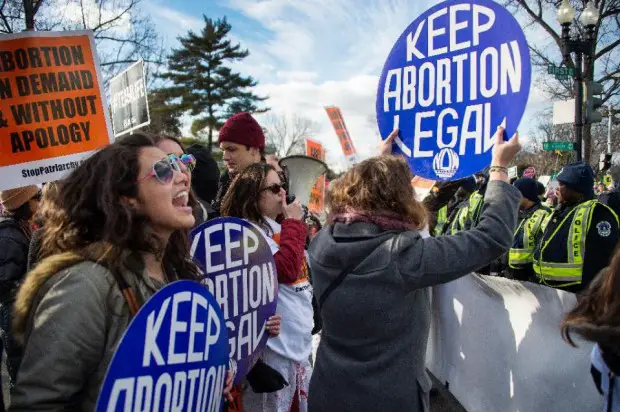What is #ShoutYourAbortion?
Three ways the new hashtag campaign aims to bring transparency and dialogue to abortion.
By Alison Miller, University of Texas at Austin
My Facebook news feed is (for the most part) blissfully free of political contention.
Sure, a few of my friends quietly post articles vetting their favorite political racehorse every now and then, but that’s about the extent of it. I like my news feed like I like my apartment: filled with adorable pictures of fluffy animals and recipes for things like XTREME Nutella Brownies and Cheesy Fried Tater Tot Tacos. None of my friends spew bigotry or engage in political cockfights – that’s why they’re my friends.
I’m a firm believer in political activism and the expression of educated opinions in a dignified, mature manner at the appropriate time – such as in your government class, or the night you find yourself two bottles deep in rosé wine with your friends – but I’m also an enthusiastic proponent of the theory that political opinions are like armpits: everyone has one, they all stink and no one wants to see anyone else’s.
Which is why I nearly fell out of my chair when, early last week, I was routinely skimming through my newsfeed and I came across a post from a friend that related a very personal anecdote of her abortion followed by #ShoutYourAbortion. Since I am, as yet, a non-initiate of the whirlpool of hashtags that is Twitter, my knowledge of the #ShoutYourAbortion trend was patchy – even so, it was pretty easy to guess at the idea of the whole business. Five minutes of Google searching and I was, as my mother is fond of saying, “in the loop.”
If there’s any topic that’s likely to turn people into single-issue voters, I think abortion is it. In a lot of ways, deciding whom to vote for in a political election can feel like picking the least of multiple evils. Generally, if a person supports 85 percent of what a candidate stands for, he/she is willing to forgive the other 15 percent that they don’t necessarily agree with.
If, for example, you really, really like a candidate’s stance on big issues like tax reform or health care, you might be able to forgive him/her for littler things – such as, maybe, their proclivity for extramarital activities or their admission that they sort of enjoyed the pot they smoked that one time in college (it’s not too soon to joke about either of those things, right?).
Obviously, different people will always have different opinions on what the big issues are – the point being that voters are willing to take the bad with the good. Less so, however, with abortion. Abortion is a hot-button topic, meaning (in my experience) that people are a lot more likely to deal with a higher percentage of things that they don’t like about a candidate in order to make sure that said candidate’s policy aligns with their personal views on abortion policy.
The reason that abortion is more likely to be a hard-line or single-issue topic is that abortion is the only issue that straddles the line between the political and the religious/ideological. When abortion hits the table, the already-fuzzy boundary between church and state in the US dissolves entirely. Along with gay marriage, it’s one of the only political issues that has been openly and explicitly proscribed by the Church.
We vote on things like taxes and educational reform based on how they will affect our lives on a material level.
Abortion, on the other hand, hits us on a spiritual, ethical, and emotional level.
Abortion has been legal in America since 1973, when the Supreme Court ruled in Roe v. Wade that a woman’s right to an abortion was protected by the right of privacy guaranteed under the Fourteenth Amendment’s concept of personal liberty.
Since then, the Supreme Court has continued to defend abortion, with a few qualifications – most of them concerning when life begins, at what point the state has a vested interest in a fetus, and the necessary waiting period and educational requirements for women who desire abortions. Over forty years since the initial verdict, and we haven’t progressed much on the issue – the debate over the fundamental morality of abortion, as well as when, how, and under what circumstances pregnancy termination services should be available, is still going strong.
As the fiscal year drew to a close yesterday, one of the biggest challenges facing Congress in drawing up a new budget for the US government was determining whether or not to continue funding Planned Parenthood, the largest provider of reproductive health services in the nation and a well-known provider of both pregnancy termination and preventative services.
Let’s also not forget the rumors swirling that Planned Parenthood has engaged in the sale of fetal body parts. Throw that in the mix, and it’s probably safe to assume that the hot tempers radiating out from Washington, D.C. are quickly becoming a major contributor to global warming. I mean, climate change. Whatever.
In the last couple of years, younger, more liberal demographics – especially those who identify as feminists – have become increasingly more vocal about abortion rights. A lot of their efforts have revolved around decreasing the stigma that has clung stubbornly to an abortion like a sorority girl clinging to her first Pumpkin Spiced Latte of the season. #ShoutYourAbortion is the most recent wave of offense in an ever more frequent surge of pro-choice, first-person abortion testimonies.
The metaphorical first shot was fired on Saturday, September 19, by Amelia Bonow (Update: Bonow has reportedly had to go into hiding). Her lengthy Facebook post, in which she recalled her abortion at a specific Planned Parenthood with “a nearly inexpressible level of gratitude,” culminated with an unequivocal statement and an openly challenging rhetorical question: “I have a good heart and having an abortion made me happy in a totally unqualified way. Why wouldn’t I be happy that I was not forced to become a mother? #ShoutYourAbortion”. The following day, Bonow’s fellow activist Lindy West carried #ShoutYourAbortion over to Twitter, along with a nod to her own abortion.
Since then, countless women have either taken up the battle cry or violently rejected it. Pro-lifers, in response to the deluge of abortion anecdotes on multiple social media platforms, have released their own storm of stories – many of them remembrances of unwanted pregnancies that were kept rather than terminated followed by a proud declaration of confidence in their decisions and, of course, the ubiquitous #ShoutYourAbortion hashtags. Other Twitterers merely admonished the #ShoutYourAbortion users that the termination of a pregnancy, regardless of the circumstances, should be treated with a more somber, less triumphant approach.
As much as I, more than anyone else I know, am inclined to cringe at anything that even has the potential to be politically inflammatory, here is why #ShoutYourAbortion is important:
1. It Makes Abortion More Transparent
Despite the near-constant buzz about abortion over the last couple of years, the actual process remains mysterious and misunderstood by a lot of people who have strong opinions on the matter.
Even those educated in the clinical and legal aspects of the procedure probably don’t have a good idea of what it’s like to be a woman sitting in the waiting room of Planned Parenthood, faced with a life-changing decision.
Regardless of your personal stance on abortion, it’s important to have a thorough command of all the factors involved – including the emotional and psychological factors. One of the largest complaints amongst pro-choicers is that the US Congress, composed as it is of an overwhelming majority of white males, is unqualified to tackle the question of female reproductive rights. By clearing the air of the confusion and superstition that has always dogged the abortion debate, both pro-lifers and pro-choicers put themselves in a better position to make their cases.
And the only way to clear that confusion and superstition is to talk about it. Irreverent? Maybe. Offensive? Perhaps. Upsetting? You betcha. Inappropriate? Absolutely not. Here is the only hard-line political statement I will make today: honesty and transparency are never inappropriate in a political debate. Anyone who is afraid to discuss abortion frankly and graphically should not be airing their opinion on the topic in the first place.
2. It Facilitates Discussion
As any therapist worth his/her degree can tell you, avoidance, suppression, and shaming are the absolute worst ways to deal with controversial feelings and memories.
Women who have chosen to undergo abortions for whatever reason deserve a chance to talk about it, to form support groups, to experience the catharsis that follows confession – despite whether their feelings are positive, guilty, regretful, etc..
3. It Boosts Awareness of the Issue
#ShoutYourAbortion, like any politically charged hashtag, has been fraught with name-calling, threats, and general nastiness. As disappointing as it is that the anonymity of the Internet often reduces its users to their middle-school-bully alter egos, there’s no denial of the fact that it’s the best platform for raising awareness of something that needs to be talked about.
And with issues like this, it’s important step back from our obsessions with political orientation and bipartisan labels and remember that abortion needs to be talked about. Frankly, honestly, and openly, in an environment devoid judgment or threats. It needs to be discussed on a level that makes it impossible for politically squeamish, non-confrontational people like me to avoid it.
















